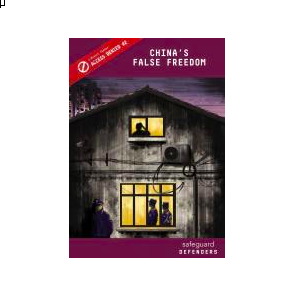China is disappearing released prisoners and detainees straight into an illegal form of house arrest completely outside the judicial system, according to a new report out today by human rights organization Safeguard Defenders.
China’s False Freedom, the second in our three-part Access Denied series, is the first in-depth study of the practice called Non-Release Release (NRR)* in which prisoners, once freed from jail or a detention centre, are arbitrarily detained by the police at their home, at a hotel or in a secret location for weeks, months or even years.
Read China’s False Freedom here (in English) or here (in Chinese).
The issue could not be more timely as the world now watches what will happen to Tibetan activist Tashi Wangchuk, who is due to be released this week after serving a five-year sentence on charges of inciting separatism. In reality, he simply advocated for Tibetan language to be taught to children in schools. It is widely expected that Tashi will be not be freed. Rather, police will likely spirit him into some form of NRR.
Well-known victims include long-suffering human rights lawyers Wang Quanzhang and Gao Zhisheng and Swedish publisher Gui Minhai, who ended up in China after being kidnapped from Thailand by Chinese agents.
“The phenomenon of non-release release is yet another example of systematic illegal behaviour by Chinese police that make a mockery of China’s justice system,” says Peter Dahlin, founder and director of Safeguard Defenders. “It renders serving your sentence or being released on bail meaningless, when being freed simply means being moved into another form of imprisonment.”
China’s False Freedom features interviews with victims, including an account by Gui Minhai’s daughter, Angela Gui, who describes how her father was kept for months in NRR in Ningbo following his release from prison before he was abducted for a second time on a train in front of Swedish diplomats in broad daylight. The report also culls data from interviews and online sources to track dozens of NRR cases since 2014.
The report reveals that it is has now almost become standard practice for police to impose NRR on “freed” activists and lawyers. While NRR may last from a few days to several months, others can languish for years. Gao Zhisheng is in the middle of six years of NRR; he remains disappeared by the state to this day.
NRR may take the form of house arrest, enforced travel and confinement to a hotel room, or confinement at a police-owned facility. Following the outbreak of Covid-19, quarantines are increasingly being used as an excuse for NRR, despite negative test results, previously undergoing quarantine in detention, and, in some cases, lasting longer than the commonly prescribed 14 days.
While Chinese police employ many kinds of arbitrary detention, NRR is the only one that is imposed on a victim immediately after they have spent months or even years in custody and thus represents a particular cruelty on the victim and their loved ones.
NRR violates Article 37 of the Constitution of the People’s Republic of China, which protects the
personal freedom of citizens. It also violates international rights laws pertaining to the right of liberty and freedom of movement. For the most serious forms of NRR, where the individual is disappeared, it amounts to an enforced disappearance as defined in the UN Convention for the Protection of all Persons from Enforced Disappearances.
Access Denied is a three-part series that examines the erosion of the rule of law under Xi Jinping. The first part, China’s Vanishing Suspects, looks at how China is registering suspects with fake names in detention centres to keep them hidden from family and legal counsel, thus violating their right to a fair trial.
*The term, NRR, was coined by expert in Chinese law and a professor at New York University School of Law, Jerome A. Cohen.
ACCESS DENIED #2 ENGLISH FINAL VERSION FULL_0




